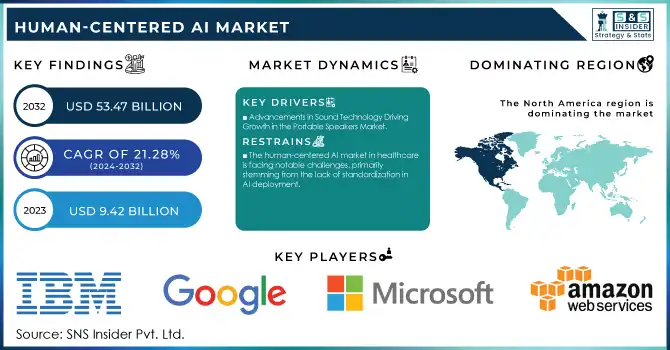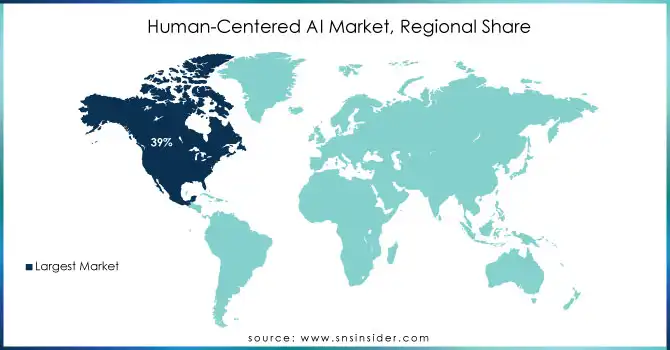Human-Centered AI Market Report Scope And Overview:

Get more information on Human-Centered AI Market - Request Free Sample Report
The Human-Centered AI Market Size was valued at USD 9.42 billion in 2023 and is expected to reach USD 53.47 billion by 2032 and grow at a CAGR of 21.28 % over the forecast period 2024-2032.
The Human-Centered AI market is witnessing significant expansion, driven by advancements in key technologies such as machine learning, natural language processing (NLP), computer vision, and deep learning. These innovations are enabling the creation of AI systems that are more personalized, adaptive, and intuitive, transforming industries such as healthcare, finance, and customer service. According to Stanford HAI, substantial investments in AI research are leading to breakthroughs that facilitate more effective collaboration between humans and AI. In healthcare, for example, AI-powered diagnostic tools and image analysis systems are improving patient care, reducing human errors, and streamlining workflows, thus accelerating market demand.
A growing focus on ethical AI is contributing to market growth, as businesses aim to develop AI systems that are transparent, fair, and accountable. With continued investment in human-centered AI research, particularly in creating systems that align with human values and ethical standards, the market is poised for rapid growth. In 2023, the United States took the lead in AI innovation, producing 61 notable machine learning models, outpacing the European Union (21 models) and China (15 models). Industry-academia collaborations also reached new heights in 2023, with 21 notable AI models resulting from joint efforts.
Stanford HAI has invested over USD 40 million in human-centered AI research, supporting more than 300 scholars across various disciplines. Public perception studies conducted with 25 members of the U.S. general public and 20 AI experts have highlighted the importance of humanness and ethics in AI development. These insights underscore the growing importance of ethical considerations as AI technologies become more integrated into daily life. The U.S.'s leadership in AI model production and the increasing emphasis on human-centered approaches are accelerating the adoption of AI systems globally, positioning them as key drivers of future technological progress.
Human-Centered AI Market Dynamics
Drivers
-
Advancements in Sound Technology Driving Growth in the Portable Speakers Market
Advancements in sound technology have become a key driver in the portable speakers market, as brands continue to innovate to enhance the listening experience. The integration of 3D audio, high-definition audio, and improved bass response are transforming the way users engage with their audio devices. 3D audio, for example, creates a more immersive experience by simulating spatial sound, giving listeners a sensation of surround sound without needing a complex speaker setup. High-definition audio ensures that music, podcasts, and other content are reproduced with clarity and precision, highlighting every nuance in the sound. Enhanced bass technology delivers deeper, more powerful low frequencies, elevating the listening experience, particularly for genres like electronic, hip hop, and rock. These technological upgrades not only improve sound quality but also encourage consumers to upgrade to the latest models, offering a clear competitive edge for brands that incorporate these advancements. As consumers increasingly prioritize premium sound quality, these innovations are essential for driving growth in the portable speaker market.
Restraints
-
The human-centered AI market in healthcare is facing notable challenges, primarily stemming from the lack of standardization in AI deployment.
Although AI holds immense promise for enhancing healthcare outcomes, the absence of uniform protocols for system integration leads to fragmented adoption across various healthcare settings. This inconsistency complicates the seamless implementation of AI solutions within existing frameworks like Electronic Health Records (EHRs) and diagnostic tools, with issues related to data formats, system compatibility, and regulatory standards. The lack of standardization impacts AI’s performance and reliability. Variations in data quality and integration obstacles can result in inaccurate diagnoses, potentially affecting patient care. Regulatory delays, caused by differing practices across regions, further hinder AI’s widespread adoption in healthcare. To fully unlock AI's potential, it is crucial to establish standardized frameworks that ensure smooth integration and improve both the quality of care and operational efficiency. Overcoming these standardization challenges is critical for advancing AI’s role in healthcare and achieving better patient outcomes worldwide.
Human-Centered AI Market Segment Analysis
By Function
In 2023, the Assistance and Support segment accounted for the largest share of the human-centered AI market, capturing about 43% of the revenue. This dominance reflects the growing use of AI-driven tools in enhancing customer service, healthcare, and enterprise efficiency. AI-powered virtual assistants, chatbots, and diagnostic tools automate routine tasks, improving productivity and reducing workloads. In healthcare, these tools assist in patient management, offering virtual consultations and real-time health monitoring, improving care delivery. Similarly, in customer service, AI systems streamline interactions, providing quick, scalable support. As industries increasingly seek efficient, cost-effective solutions, the demand for AI-based assistance and support continues to rise, further driving market growth.
By Application
In 2023, Chatbots and Virtual Assistants led the human-centered AI market, capturing around 34% of the revenue. This segment's dominance is driven by the rising demand for AI-powered customer service solutions across industries like healthcare, finance, and e-commerce. Virtual assistants and chatbots enhance user experience by offering real-time, personalized support, answering inquiries, and automating tasks. In healthcare, they assist with patient scheduling, medication reminders, and symptom tracking, improving care efficiency. Similarly, businesses rely on AI for customer service automation, reducing operational costs and enhancing service availability. The increasing adoption of AI for these applications underscores the growing need for efficient, scalable, and cost-effective solutions, further fueling market growth.
Human-Centered AI Market Regional Overview
North America holds the largest share of 39% in the human-centered AI market as of 2023, driven by the region’s advanced technology infrastructure and widespread adoption of AI in healthcare, finance, and customer service. The United States, in particular, leads in AI research and development, backed by key players such as Google, IBM, and Microsoft, contributing to a highly innovative environment. This dominance is also supported by substantial investments in AI technologies, both from private companies and government initiatives. Healthcare applications, including AI-driven diagnostic tools, virtual assistants, and telemedicine platforms, are rapidly expanding, improving patient outcomes and operational efficiency. Regulatory frameworks in North America encourage AI integration by setting clear guidelines for ethical and secure deployment, further bolstering market growth.
Asia-Pacific is the fastest-growing region in the human-centered AI market, fueled by rapid advancements in technology and widespread adoption in healthcare, finance, and manufacturing. Countries such as China, Japan, and India lead the charge in AI development, supported by government initiatives like China's plan to become a global AI leader by 2030. AI tools are revolutionizing healthcare by improving diagnostics, patient care, and efficiency while reducing costs. Additionally, the increasing use of AI-driven solutions such as chatbots and virtual assistants is expanding across industries. The region's vast population provides valuable data for AI development, while tech infrastructure investments and a skilled workforce ensure continued growth in the market.

Get Customized Report as per your Business Requirement - Request For Customized Report
Key Players in Human-Centered AI Market
Some of the major companies in the Human-Centered AI market, along with their products:
-
IBM (Watson Assistant, Watson Health, Watson for Oncology)
-
Google (Alphabet Inc.) (Google Assistant, Google Health, DeepMind AI)
-
Microsoft (Azure AI, Cortana, Healthcare Bot)
-
Amazon Web Services (AWS) (Alexa, AWS AI Services, Amazon HealthLake)
-
Nuance Communications (Nuance AI, Dragon Medical, Nuance Virtual Assistant)
-
Salesforce (Salesforce Einstein, Salesforce Health Cloud)
-
Oracle (Oracle AI, Oracle Digital Assistant)
-
Apple (Siri, HealthKit, Core ML)
-
Baidu (DuerOS, Baidu Apollo for autonomous driving)
-
Cognizant (Cognizant AI, Virtual Assistant Services)
-
Accenture (AI for Business Transformation, myConcerto)
-
Siemens (MindSphere, Siemens Healthineers AI Diagnostics)
-
Hewlett Packard Enterprise (HPE) (HPE AI, HPE Pointnext AI Services)
-
Intel (Intel AI, Intel Nervana, AI-based healthcare solutions)
-
SAP (SAP Leonardo AI, SAP Conversational AI)
-
Tencent (WeChat AI, Tencent Cloud AI, AI-powered medical solutions)
-
Mistral AI (Mistral AI-powered tools for decision support)
-
UiPath (UiPath AI, RPA with AI integration for process automation)
-
Pega Systems (Pega AI, Pega Customer Decision Hub)
-
Zoho Corporation (Zia AI, Zoho SalesIQ with AI integration)
List of potential customers in the Human-Centered AI market:
-
Mayo Clinic
-
Cigna
-
Pfizer
-
General Motors
-
Walmart
-
UPS
-
American Express
-
L’Oreal
-
Coca-Cola
-
Siemens
-
JPMorgan Chase
-
T-Mobile
-
Accenture
-
H&M
-
Netflix
-
DHL
-
Delta Airlines
-
Roche
-
Samsung
-
Verizon
Recent Development
-
September 5, 2024: IBM Consulting partners with the Smarter Balanced Assessment Consortium to develop AI governance principles for education. Their collaboration focuses on enhancing fairness and personalization in assessments, guided by a multidisciplinary advisory panel to ensure responsible AI implementation in K-12 education.
-
October 7, 2024: AWS participated in Advertising Week and the NAB Show in New York, showcasing how its platform supports media companies in content monetization and broadcast workloads. Highlights include sessions on data-driven storytelling and human-centric AI, aimed at enhancing creativity and driving engagement across platforms.
-
April 18, 2024: Siemens announced the upcoming launch of Siemens Industrial Copilot on the Siemens Xcelerator Marketplace this summer. In collaboration with Schaeffler and Microsoft, the company will showcase cutting-edge technologies such as AI, digital twins, and industrial metaverse applications at Hannover Messe, aiming to drive sustainability and competitiveness across industries.
-
September 27, 2024: SAP released the updated AI Ethics Handbook, offering a comprehensive guide to applying their global AI ethics policy. It now includes specific principles for generative AI, helping developers create ethical AI solutions that align with SAP's commitment to responsible, reliable, and relevant AI.
| Report Attributes | Details |
|---|---|
| Market Size in 2023 | USD 9.42 Billion |
| Market Size by 2032 | USD 53.47 Billion |
| CAGR | CAGR of 21.28% From 2024 to 2032 |
| Base Year | 2023 |
| Forecast Period | 2024-2032 |
| Historical Data | 2020-2022 |
| Report Scope & Coverage | Market Size, Segments Analysis, Competitive Landscape, Regional Analysis, DROC & SWOT Analysis, Forecast Outlook |
| Key Segments | • By Function (Decision-Making & Support, Workflow Automation, Safety And Security, Assistance And Support, Collaboration And Others) • By Application (Chatbots And Virtual Assistants, Medical Diagnostic, Quality Control, Personalized Learning, Fraud Detection & Risk Assessment, And Human Resources) • By End User (Retail & E-Commerce, Healthcare, Automobile, Education, Transportation & Logistics, Manufacturing) |
| Regional Analysis/Coverage | North America (US, Canada, Mexico), Europe (Eastern Europe [Poland, Romania, Hungary, Turkey, Rest of Eastern Europe] Western Europe [Germany, France, UK, Italy, Spain, Netherlands, Switzerland, Austria, Rest of Western Europe]), Asia Pacific (China, India, Japan, South Korea, Vietnam, Singapore, Australia, Rest of Asia Pacific), Middle East & Africa (Middle East [UAE, Egypt, Saudi Arabia, Qatar, Rest of Middle East], Africa [Nigeria, South Africa, Rest of Africa], Latin America (Brazil, Argentina, Colombia, Rest of Latin America) |
| Company Profiles | IBM, Google (Alphabet Inc.), Microsoft, Amazon Web Services (AWS), Nuance Communications, Salesforce, Oracle, Apple, Baidu, Cognizant, Accenture, Siemens, Hewlett Packard Enterprise (HPE), Intel, SAP, Tencent, Mistral AI, UiPath, Pega Systems, and Zoho Corporation |
| Key Drivers | • Advancements in Sound Technology Driving Growth in the Portable Speakers Market |
| Restraints | • The human-centered AI market in healthcare is facing notable challenges, primarily stemming from the lack of standardization in AI deployment. |

